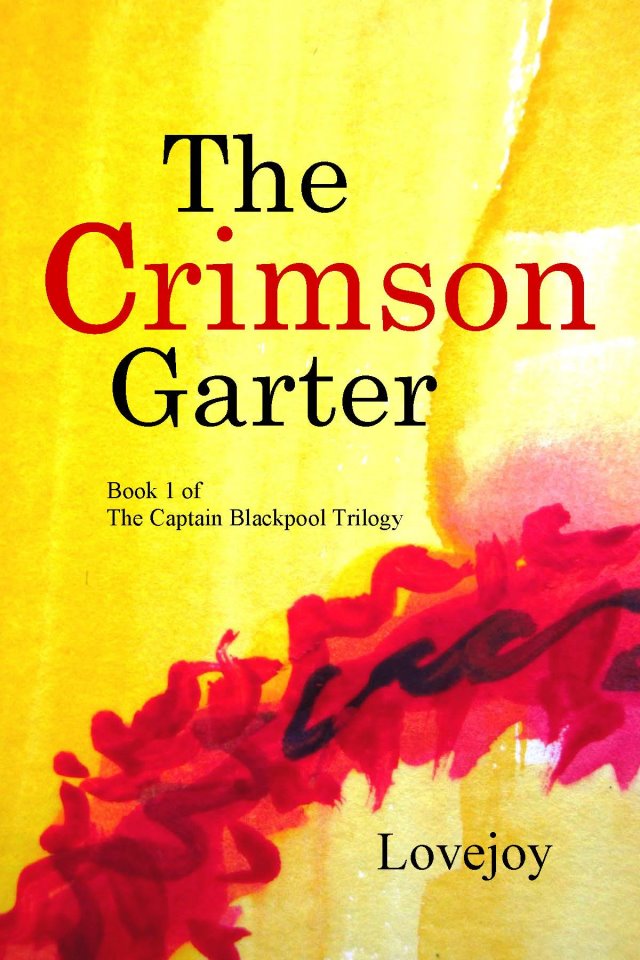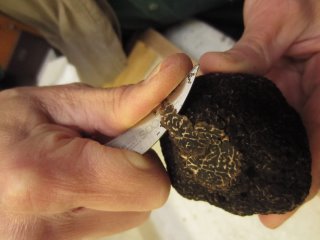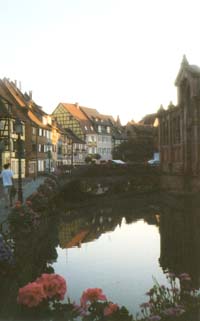
We have an idea where Grazia, Count Kozlowski, Capt Harry Blackpool and Sir Robert Marsh are as they follow their leads on the Continent, but what of Vittorio Rosetti? In the penultimate chapter of The Crimson Garter, we discover just why Strasbourg is such a crossroads on the Continent. Lucire travel editor Stanley Moss, writing pseudonymously as Lovejoy, continues his story
Chapter 17
Nothing recommended the auberge on the road to Strasbourg. Not the ramshackle shingling, long in disrepair, overgrown with moss and the omnipresent weed; not the dull and weather-worn planking on the grey façade; not the muddy courtyard thick with potholes; not the dim-witted giant named Beau’petit with his dullard voice, who dragged the horse to the stable and then clumsily attended to the bags, ducking his head as he went through the doorway which was low to begin with; not the avaricious innkeeper, Annette, tight fisted with dirty blonde hair, tiny eyes, pasty face and bad teeth, wearing about her neck a ratty silken bag, in which she kept the meagre coins she demanded for every service and amenity; not the harsh amber brew which they claimed was ale, thick with the scents of herbs added to disguise its bitter and near-unpalatable taste; not the wretched concoction represented as pot au feu, served neither in a pot, nor even barely warm; not the sticky surface of the rough wood tabletops in the dingy tavern room; and certainly not the inept painting of a ship foundering on a stormy sea, which presided over the room from above the worn wood mantle.
The traveller had suffered some trepidation even before he entered the beamed space, for a billy-goat with clanging bell about its neck first demanded the right to exit, causing him to stand aside before he could even cross the portal. Now seated at the table, the well dressed man waited alone, wearing an expression of extreme dissatisfaction. It had taken him several minutes to make himself understood to Beau’petit, who seemed to speak a kind of guttural patois, half-French, half-German, with a great many missing consonants, rendering it largely incomprehensible. Finally he had resorted to gestures to complete the communication, was accosted again by the goat, and found himself a victim of the unsuccessful attempts by Annette to situate him in the best room in the house, which proved to be smaller than a closet, filthy, furnished by a single straw mattress, which she proudly explained he would have to himself. The gentleman demurred, secretly glad he had left his carriage and belongings back at a finer quality hostel in Strasbourg, and as he sat on the oaken bench in the dingy tavern he absently pulled his dove grey gloves on to protect his finely manicured hands from whatever lived on the tabletop. Absently he squared the portfolio he had brought with him to the edge of the table, looked around in dissatisfaction, returned to his musings. It had been a frantic ride from Paris, and he longed for a hot bath and a snifter of fine cognac, but all that rested before him was the local beer, which he chose not to drink. And so he waited for his appointment, apparently late, and as he waited his impatience grew. He anxiously drummed his fingertips on the wood, and cast his eyes upwards to the tawdry painting, a work rendered in bilious colours, dramatizing a lopsided ship, riding on a tempestuous sea, headed for sinister black rocks.
The painting itself brought back memories of his entire journey. The stormy sea represented the culmination of Vittorio’s journey on the sailing ship Admirable, under the stewardship of Captain Wright. The captain had lived up to the important parts of his claims: the ship had indeed been first into the Channel after the storm had passed, and for hours no other sails were sighted. But a sudden squall crept up on them, blew them far south, off the Catalonian Coast, into a night of terrible weather, where the Captain’s able seamanship surely saved their lives, and true to his word the craft held together until its dramatic crash, running aground on a rocky shore. The wind died, and as day broke over the aftermath of the storm Vittorio Rosetti set foot upon Spanish soil, onto a seemingly deserted beach, where an armed band appeared out of the trees and arrested him. Despite his vociferous protests he was promptly taken into custody by the local authorities, and thrown into a mediæval cell, forced to endure the barbaric company of others less fortunate, who somehow existed chained to the stone walls in unbelievable misery. The filth, stench, indignation and fleas prevented him from any sleep that night.
By the next morning Captain Wright had been permitted to revisit the Admirable in hopes of salvaging some of the records and ship’s stores. He first retrieved Vittorio’s sea chest, and once it had been surrendered, the local constable laboriously picked through the suspect’s possessions, dispatched a rider to the provincial governor, who himself returned with the messenger, uttering continuous apologies to the esteemed Señor López—a horrible mistake, unthinkable this could have happened, punishments to be handed out, absolutely uncalled for, most regrettable, if he could be of any service, even the slightest thing do not hesitate to ask—and that evening Vittorio slept in the grandest room at the governor’s palace, following an opulent feast, endless bottles of rioja and port, and wild flamenco dancing on the tabletops, which went on for hours after he retired, exhausted, to his ornate bed.
Shipwrecked in Catalonia, Vittorio’s able mind calculated how distant he was and how late he had become. He had certainly missed his rendezvous in Paris with Captain Blackpool. The ball at Baron Schluysen-von Holstein’s had long transpired. He puzzled frantically, wondering if his sister was lost in the very gale which had forced him so far south. He struggled with the possibilities of how far advanced and more calamitous uncontrollable events had developed. The Spanish governor insisted on a bevy of local introductions, which caused Vittorio a half-day’s delay with interminable audiences, bows, letters. But finally his distraction and exasperation became so evident to his hosts that a hasty escort by the governor’s own regiment was arranged to accompany him to the frontier, where he crossed into France, located fresh horses, and raced in the direction of Paris.
Vittorio found Paris deserted and placid, as if the energy expended on the masked ball had been so vast that a respite was needed by all. There was a strange emptiness to the streets, a prevailing and unsettling quiet, weary expressions on the faces of the normally animated Parisians. He soon retrieved a cryptic note written by Blackpool, which, while reassuring him that his sister was safe, did little to ameliorate his anxiousness. There was no mention of the painting. Blackpool reported that Robert Marsh had returned to Scotland. The further directive that he hasten to the auberge, outside of Strasbourg, heightened Vittorio’s suspicion and dread. Consumed by annoyance and a sense of urgency Vittorio took to the road, riding most of the night to the Alsatian province. As soon as he had situated himself at his hostel he hurried on to the miserable place where he now sat stewing, perturbed at Blackpool’s increasing tardiness, preparing himself for the worst.
Vittorio was roused from his meditations by the sound of loud argument outside in the courtyard. Annette’s unmistakable shrill yowl, the angry tone of a harsh-voiced man, the sudden quacking of ducks startled by the altercation, more howling by Annette, Beau’petit’s deep gruntings. Vittorio watched as the dull giant loped through the tavern, bearing a cumbersome, worn travelling case. Seconds later an imposing figure loomed in the doorway, walked in, noted another person in the darkness of the otherwise empty room, and said in an irritated fashion, ‘I have been riding all night, following the trail of some gypsies who are supposed to be encamped near here. You, sir: do you know if one can get intelligible answers in this damned place?’ Seven years had changed nothing. Vittorio had recognized the voice instantly.
‘It would seem not, Marsh,’ he answered.
Sir Robert Marsh squinted into the gloom, fumbled around the heavy table and took a position across from Vittorio, examining his elegantly dressed form, which was lit in the dim light from the embers of the adjacent fireplace.
‘Rosetti!’ he finally stammered. ‘Is that you?’
Vittorio rose. ‘Yes, it is I. Frankly, I had no expectation of meeting you in this godforsaken place.’
‘So, you are behind all this. I suspected as much. Hand over my wife now.’
‘If my sister is not with you, then that is your own fault,’ Vittorio said. ‘Has Blackpool arranged this?’
‘Who, pray, is Blackpool? Where is my wife?’
‘Obviously you did not hear me. Where is my sister? I placed her in your care, which I have discovered has left her deprived, starving, imprisoned, and without affection. What have you done with her?’
Sir Robert frowned. ‘So it has been you all along. You have been responsible for all the calamities which befell me. Do not mock me by pretending your ignorance of Grace’s whereabouts. Produce her now. It is clear to me that you have somehow contrived to have her desert me, you schemed to purloin the Wickham Library, and without doubt you are behind the humiliation I have endured over the painting, do not deny you know what I am talking about. It was hardly the conduct of a gentleman, pandering your own sister to a bohemian artist. All of this has culminated in the death of my poor mother, who suffered much agony over the disgrace you wrought.’
Vittorio registered real exasperation. ‘I know nothing about a bohemian artist,’ he said. ‘Nor about a painting. Nor the death of your mother. Your accusation is without merit, unfounded. As for the Wickam Library, I merely made a more realistic offer to the seller. I see no illegality in that. You were free to offer as much money as you thought fair. So was I.’
‘You admit you arranged for it to be taken from the auction. And you are behind the disappearance of my wife!’ Marsh leaned across with a tense expression, tightening the corners of his mouth, placing his clenched fists on the sticky tabletop.
‘I admit to no such thing,’ said Vittorio Rosetti. ‘How dare you stand there and accuse me when I have repaid you, in full, and with every penny of interest? All the loans are settled, and I have come back to make sure that the well being of my sister is accomplished. I now see that I committed a grave error in leaving her in your care. You have proved to be worse than a useless husband, abusive, and I only hope that my sister has not been irreparably damaged by your reprehensible conduct.’
‘How dare you!’ Marsh snarled. ‘I demand satisfaction!’
‘You shall have it,’ Vittorio said. He pulled first from his waist a small Lafaucheux revolver with beautiful ivory handles, and placed it on the table. ‘I am from the old school, though. A foil or sabre would suit me.’
The exchange had not gone unheard by Annette and Beau’petit, who pressed their ears tightly against the partition in a kind of comic pose, the giant towering over the innkeeper, both blinking their eyes, open-mouthed, gesturing silently, frantically to each other at every escalation. With the mention of weapons, they gathered themselves up and rushed from the auberge to escape the vicinity of live ammunition flying, Annette dragging Beau’petit by a corner of his shabby doublet, the giant whimpering and struggling as he went. The shouting continued as they fought with each other in the doorway, competing to be first outside.
Two figures were walking up the road to the inn, a burly gypsy man with a hearty laugh, accompanied by a willowy woman attired in a simple gypsy costume. As they approached the gateway they observed Annette and Beau’petit racing from the doorway.
‘Help! Help!’ Annette began to scream in her barely-understandable patois. ‘Two gentlemen inside are coming to blows! They will surely kill each other!’
A great grin came over Viktor’s face, and he heightened his pace towards the inn, for he was a man enamoured of conflict, and accustomed to duels. Grazia stepped in front of him. ‘Should we not find some help?’ she asked. ‘Perhaps this is a dangerous situation, one or both could already be wounded.’
‘Ah, do not worry,’ Viktor replied, putting a finger to the side of his nose. ‘I can tell you what is happening. Tempers are flaring, listen! It will all be resolved quickly, trust me. One or the other will soon be dead.’
‘Dead! Dead in my inn! That cannot be!’ Annette cried, suddenly fluent.
‘Calm yourself,’ Viktor told her. ‘I shall go in and investigate the situation.’
Grazia had no desire to remain outside with the hysterical woman. ‘I am going in there with you,’ she said. And as she marched towards the door behind Viktor she realized there was something vaguely familiar about the muffled voices coming from within. Viktor blustered into the dim tavern area.
‘Come, come! What’s going on in here?’ Viktor announced. He had expectations of seeing Captain Blackpool inside, standing over his latest victim, with his exotic knife bloodied in his hand. Grazia, close on Viktor’s heels, froze in shock when she saw who was engaged in the shouting match. The men stopped too, interrupted by the gypsy king’s interference. Looking beyond him they caught a glimpse of La Fragolina, leaning around his massive silhouette. A stunned silence followed.
‘I thought you were dead!’ Grazia cried out, looking at Vittorio.
‘I thought so, too!’ Marsh joined in quickly.
‘Who are these men?’ Viktor demanded. ‘You know them?’
‘He is my brother,’ Grazia replied, with a contemptuous jerk of her exquisite chin. ‘And he is my husband,’ she said, pointing her finger dramatically.
‘Grace, where have you been? I have travelled halfway across Europe looking everywhere for you! I demand an explanation, and what are you doing in that ridiculous costume?’ Grazia ignored Robert’s question, pushed Viktor aside, and rushed to her brother, where they embraced, clutching each other in a moment of breathless reunion. She pulled herself away from him after only a few moments and stepped back with a curious expression on her face, tears still damp on her cheeks. Then she slapped him hard on his face.
‘Where have you been all these years? It is I who demand an explanation. Do you have any idea how much I have suffered, how many nights I fell asleep thinking about you, wondering if there was anything I could have done to prevent your suicide? Tell me the truth! What has happened?’
‘Grazia, you had to live in ignorance all these years. Marsh and I concocted a plan before I left Paris, which involved falsifying my own suicide for your protection. It was done so that debtors would not pursue you, to preserve our honour. He promised he would take care of you, and if I met with death or did not return he would marry you. I was able to rebuild my fortune in the New World. I have accomplished that, Grazia, and I now possess all the money that you could possibly ever need.’ He gestured helplessly at the portfolio on the table before him.
‘Wait! You concocted a scheme where you both planned to deceive me? What kind of protection is that, I ask you?’ Though Grazia did not know it, she had assumed a haughty stance, hands on her hips, and fire blazed in her eyes.
‘No, no, Grace, he is not explaining this at all correctly! I offered to help him in his moment of need, and I offered to protect you. It was not some scheme to deceive you, it was an act done out of …’—here Marsh hesitated, searching for the right word—‘love. The suicide was his idea.’
‘That is a lie!’ Vittorio protested.
‘How dare you!’ Robert Marsh bellowed. ‘It is the truth.’
‘No, you distort things!’
La Fragolina stepped forward. ‘Robert, you knew all along that my brother Vittorio was alive?’ Sir Robert looked down. ‘Did you know this, yes or no?’
‘I only knew that he was alive when he left Paris,’ Marsh stammered. ‘But after that I had no news of him, from him; why, he could have died in the middle of the ocean for all I knew.’
‘And you, Vittorio: seven years, and not a single letter, not a word to reassure me?’
‘How could I write to you, Grazia? What would you have thought of me? It was years before I had barely a penny to my name. What could I have brought to soothe your grief and misery? But now here I am, I have come back to make good. I have come back to make sure that you will no longer suffer!’
‘This is truly wonderful,’ the gypsy king exclaimed. ‘The brother comes back to save the sister!’
‘This is terrible!’ Grazia cried, grabbing a bowl from the table, hefting it menacingly and hurling it to the ground, where it shattered. ‘You have both deceived me, my husband and my brother. You both disgust me. How could you treat me this way?’ She looked at the gypsy king. ‘And you,’ she said. Viktor slunk back a step.
‘A moment, Grace,’ Sir Robert Marsh interrupted. ‘How can you represent that I disgust you when you have behaved in a most unwifely way? First there is this scandal of a painting, and do not look surprised, for I have had news of it now for many weeks, and you share the blame, albeit indirectly, for the death of my mother. Now I find you attired in faded rags, miles away from London, where I last left you, and I demand an explanation.’
‘Do not speak to my sister that way,’ Vittorio said, threateningly.
‘You both are impossible!’ Grazia cried. ‘I don’t care, go ahead! Kill each other.’
‘I will second,’ the gypsy king offered energetically. ‘But who shall it be? The brother? Or the husband?’ He looked at La Fragolina. ‘The husband or the brother? Tell me who shall I second?’
As the argument continued, two riders caparisoned on fine horses approached the auberge from the east, occupied in a lively exchange of impressions.
Related articles hand-picked by our editors
 On the scent of black truffles
On the scent of black truffles
Stanley Moss goes in search of the elusive black truffle in an unsuspecting French village
photographed by Paula Sweet
 Off to London, Lisbon,
Livorno, Lille, Lahore
Off to London, Lisbon,
Livorno, Lille, Lahore
Travel editor Stanley Moss updates us on his wanderings, brought
to you by the letter L
photographed by the author
 Colmar: liberty, equality,
artistry
Colmar: liberty, equality,
artistry
One of the Alsace’s most beautiful towns where art and music play
an integral part of its identity—not to mention Colmar’s
stunning canals by Jack Yan
photographed by the author
Advertisement
Copyright ©1997–2022 by JY&A Media, part of Jack Yan & Associates. All rights reserved. JY&A terms and conditions and privacy policy apply to viewing this site. All prices in US dollars except where indicated. Contact us here.